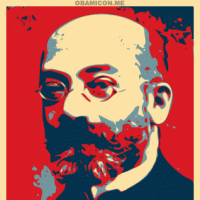Hozzászólások: 9
Nyelv: English
Rohan (Profil megtekintése) 2008. május 10. 20:18:42
What's correct: 'Kiu estas via nomo?' or 'Kio estas via nomo?'?
'Kio estas via nomo' is what is mentioned on this site, but couldn't that question have the answer, "My name is an abstraction used to identify me."? It seems I have a flawed conception of the meaning of 'kio'...
Miland (Profil megtekintése) 2008. május 10. 21:14:24
Kio estas via nomo?, Kiu estas via nomo?, Kiel vi nomiĝas?, Kia estas via nomo? are all good Esperanto. All are correctly answered Mia nomo estas X or Mi nomiĝas X.
The following is a link to a response from a member of the Academy of Esperanto and is as near as you'll get to an 'official' answer:
"KiO estas via nomo?" aŭ "KiU estas via nomo?"
mnlg (Profil megtekintése) 2008. május 11. 7:27:08
Rohan:'Kio estas via nomo' is what is mentioned on this site, but couldn't that question have the answer, "My name is an abstraction used to identify me."?Precisely. That's why I don't use it. I am aware of mr. Wennergren's reply but I can't bring myself to fully agree with him.
The mere fact that there would be no other easy way to ask about the nature or definition of your name (= "it is a symbol by which I can be identified or summoned", or anything of this sort) is to me a good enough reason to keep "kio" for this task (which it pretty much always fulfills with every question that has the verb "esti", like "kio estas leono?" or "kio estas domo?"). On the other hand, "kiu" is always used to identify an element among many, and that's why I feel "kiu" is the best and most natural choice for this question.
If you wish, you can dodge the problem altogether by switching to "Kiel vi nomiĝas?".
Miland (Profil megtekintése) 2008. május 11. 10:26:44
Perhaps we could say that the question 'What is your name?' and the various Esperanto renderings of it, are asking not just for information but action - to name oneself. They are the equivalent of Diru al mi vian nomon. Insofar as they are all commonly accepted among users of Esperanto, they are functionally equivalent.
mnlg (Profil megtekintése) 2008. május 11. 15:53:02
Miland:The questions by which we usually ask for someone's name in Esperanto are all capable of ambiguity.Well, every sentence is potentially subject to ambiguity; however, yes, I wouldn't use "kiel" for the same reason you cite (perhaps "kiel sonas via nomo" or "kiel skribiĝas via nomo" could be less ambiguous). However, personally, I like to keep a certain coherence of use for the pronoun commonly used to ask for specificity (kiu), and the pronoun commonly used to obtain an explanation, a clarification, a general idea (kio). In every other example with the verb "esti" that I can think of, I would never use "kio" to get a specification, a name, a way to identify a singular person or object (or would you say, "kio estas la prezidanto de UEA?", to get his or her name? You'd most probably get a class, "homo", or "vir(in)o", or an explanation, "estas persono kiu elektiĝis en posteno...", etc.).
Perhaps we could say that the question 'What is your name?' and the various Esperanto renderings of it, are asking not just for information but action - to name oneself.Perhaps, but I don't subscribe to that.
I do not generally suggest to use "kio" to ask for a name. On the other hand, for some reason, perhaps as a translation of the same question from other languages, the form is, admittedly, rather common. I never really felt it to be sound and proper, but it is actively used, and as much as I'd prefer to see it being rejected over time, I do not go out and persecute those who use it. If the majority of speakers, being aware of the objections against it, choose to keep it anyway, it will eventually become a part of the language.
I tried to get someone more experienced than me to convince me that "kio" is perfectly acceptable in that form. I see it taught in a few courses and I am honestly concerned by that (as long as it is taught it will be used by beginners, because "the course uses it"; and this could, at least in part, explain its recurrence). I haven't been convinced so far (even though I had a long, friendly and interesting correspondence with a few members of the Akademio), but along the way I have found a considerable number of high-ranking esperanto speakers who agree that "kio" is not acceptable. As Pyrrhic as it may sound, and barring revelations, I guess that right now I would only accept it if it were agreed that it is an exception from its more common use.
Miland (Profil megtekintése) 2008. május 11. 16:57:49
I am not aware on the other hand of any established E-o textbook or reference grammar that suggests that Kio estas via nomo? is wrong.
But such debates could go on forever. Better not to waste too much time on them, since (as mnlg has indicated) usage in the community will be the judge in the long term.
NKapustin (Profil megtekintése) 2008. május 12. 2:50:38
Frakseno (Profil megtekintése) 2008. május 12. 7:20:03
You may do the first two items in this order or do them at the same time - I did them simultaneously:
1. Do the mail order course, complete it, get your nifty certificate of completion.
2. Get a decent book, "Teach Yourself Esperanto," or "Esperanto: Learning and Using the International Language" by Richardson (the Richardson book is my favorite). The first is out of print and I got mine on eBay. The second is available via ELNA's online bookstore. I really recommend the Richardson book.
3. Post on these boards with your questions, and with beginner's Esperanto
4. Listen to Esperanto podcasts online (I like Radio Verda).
But remember to have fun doing all of the above! It's a great feeling when you realize that you are getting it!
Miland (Profil megtekintése) 2008. május 12. 9:26:14
NKapustin:Say I live in a small town area where there is no chance of a tutor .. What is the best way to go about learning the language?Frakseno's advice is excellent. Apart from that, if there is a time, it may be a good idea to work through some of the courses on this website at your level.
That will do fine for now. Good luck!




